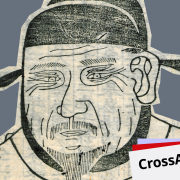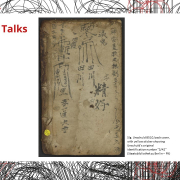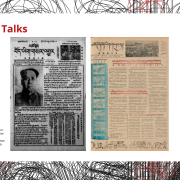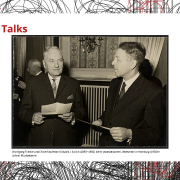CrossAsia Talks: Joan Judge 20.11.2025
(See English below)
Am 20. November 2025 ab 18 Uhr wird Prof. Joan Judge (York University) in einem Onlinevortrag mit dem Titel “New Conceptions: Modes of Knowing in Chinese Encyclopedias for Everyday Life” neue Perspektiven auf die alltägliche Nutzung medizinischer Praktiken im vormodernen China präsentieren. Neben gedruckten Materialien werden auch Handschriften aus der Sammlung Unschuld berücksichtigt.
Scholars have debated the epistemic status of the Comprehensive Compendia of Myriad Treasures (wanbao quanshu 萬寶全書), a genre of daily-use texts widely reproduced in China from the sixteenth through the early twentieth centuries. This presentation seeks to deepen our understanding of both the content and the potential readership for these texts in the late imperial and Republican Chinese contexts. It does so by engaging in a close and contextualized examination of one section of the compendia that remained remarkably stable over the course of this period, the section on “Pregnancy” (Zhongzi men 種子門).
I first probe the sources for this section in an effort to determine the register of knowledge that it reproduced. This requires unraveling a complex amalgam of what could be characterized as works on bedchamber arts on the one hand, and scholarly medical treatises on the other. I then examine the different components of the section: its crude illustrations and mnemonic verses which both describe the development of the embryo, together with numerical calculations for determining the health and sex of the fetus, and recipes for managing the various ailments that might afflict the gestating woman.
Throughout this analysis, I use intratextual methods to attempt to determine who the potential users of the text might have been: who, for example, would have been best served by the illustrations, the poems, the recipes, or a combination of them. I will also use intertextual methods to search for the audience for the “Zhongzi men.” Here I will examine a hand-written gynecological manuscript from the Unschuld Collection that copied the contents of the section almost verbatim. This manuscript offers some sense of who read and valued the material on “Gestation” in the myriad treasures enough to use it as an authoritative source.
Die Vortragssprache ist Englisch. Bei Fragen kontaktieren Sie uns unter: [email protected].
Der Vortrag wird via Webex gestreamt. Sie können am Vortrag über Ihren Browser ohne Installation einer Software teilnehmen. Klicken Sie dazu unten auf „Zum Vortrag“, folgen dem Link „Über Browser teilnehmen“ und geben Ihren Namen ein.
Alle bislang angekündigten Vorträge finden Sie hier. Die weiteren Termine kündigen wir in unserem Blog und auf unserem X-Account, Mastodon und BlueSky an.
—
On 20 November 2025 from 6 pm, Prof. Joan Judge (York University) will present an online lecture entitled ‘New Conceptions: Modes of Knowing in Chinese Encyclopedias for Everyday Life’ providing new perspectives on the everyday medical practices in pre-modern China. Besides printed materials manuscripts from the Unschuld Collection will also be considered.
Scholars have debated the epistemic status of the Comprehensive Compendia of Myriad Treasures (Wanbao quanshu 萬寶全書), a genre of daily-use texts widely reproduced in China from the sixteenth through the early twentieth centuries. This presentation seeks to deepen our understanding of both the content and the potential readership for these texts in the late imperial and Republican Chinese contexts. It does so by engaging in a close and contextualized examination of one section of the compendia that remained remarkably stable over the course of this period, the section on “Pregnancy” (Zhongzi men 種子門).
I first probe the sources for this section in an effort to determine the register of knowledge that it reproduced. This requires unraveling a complex amalgam of what could be characterized as works on bedchamber arts on the one hand, and scholarly medical treatises on the other. I then examine the different components of the section: its crude illustrations and mnemonic verses which both describe the development of the embryo, together with numerical calculations for determining the health and sex of the fetus, and recipes for managing the various ailments that might afflict the gestating woman.
Throughout this analysis, I use intratextual methods to attempt to determine who the potential users of the text might have been: who, for example, would have been best served by the illustrations, the poems, the recipes, or a combination of them. I will also use intertextual methods to search for the audience for the “Zhongzi men.” Here I will examine a hand-written gynecological manuscript from the Unschuld Collection that copied the contents of the section almost verbatim. This manuscript offers some sense of who read and valued the material on “Gestation” in the myriad treasures enough to use it as an authoritative source.
The lecture will be held in English. If you have any questions, please contact us: [email protected].
The lecture will also be streamed via Webex. You can take part in the lecture using your browser without having to install a special software. Please click on the respective button “To the lecture” below, follow the link “join via browser” (“über Browser teilnehmen”), and enter your name.
You can find all previously announced lectures here. We will announce further dates in our blog and on X, Mastodon and BlueSky.

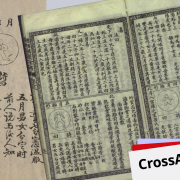
 Staatsbibliothek zu Berlin – PK, Bandō-Sammlung, Depositum des Deutschen Instituts für Japanstudien, Signatur H 52
Staatsbibliothek zu Berlin – PK, Bandō-Sammlung, Depositum des Deutschen Instituts für Japanstudien, Signatur H 52